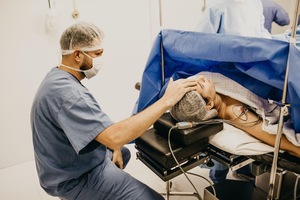Introduction
Medical malpractice is a serious concern for patients and healthcare providers alike. When individuals seek medical treatment, they trust that professionals will provide the highest standard of care. However, when that trust is breached due to negligence or incompetence, it can lead to devastating consequences. In the bustling city of Los Angeles, where healthcare facilities are abundant and diverse, understanding the steps you need to take if you suspect medical malpractice is crucial for safeguarding your rights and well-being.
In this comprehensive guide, we’ll delve into the intricacies of medical malpractice, exploring what constitutes malpractice, how to recognize it, and the steps you should follow if you find yourself in such a situation. From gathering evidence to seeking legal representation, we’ll cover every aspect of this complex issue. So buckle up as we embark on this informative journey!
What to Do If You Suspect Medical Malpractice in Los Angeles
If you suspect medical malpractice in Los Angeles, your first instinct may be confusion or fear regarding what steps to take next. It's essential to act thoughtfully and strategically. Here's a roadmap to guide you through the process:
Recognize Signs of Medical Malpractice
Understanding what constitutes medical malpractice is the foundation for taking effective action. Medical malpractice occurs when a healthcare provider fails to meet the accepted standard of care in their field, resulting in harm or injury to a patient.
Document Everything
Begin by meticulously documenting every detail related to your case. This includes medical records, prescriptions, appointment dates, conversations with healthcare professionals, and any other relevant information.
Seek a Second Opinion
If possible, consult another healthcare professional who can evaluate your condition independently. This step can help clarify whether negligence occurred.
Consult with a Malpractice Attorney
Engaging an attorney experienced in medical malpractice cases can provide clarity on your situation and help determine whether you have a viable claim.
File a Complaint with Medical Board
In California, patients can file complaints against healthcare providers with the California Medical Board or appropriate licensing body.
Consider Alternative Dispute Resolution
Mediation or arbitration might be options before pursuing litigation; these methods can sometimes resolve disputes more efficiently than going through court.
Understanding Medical Malpractice
What is Medical Malpractice?
Medical malpractice refers to negligent actions taken by healthcare providers that result in harm or injury to patients. To establish a successful claim for medical malpractice in Los Angeles, four critical components must be proven:

- Duty of Care: The provider had an obligation to provide care. Breach of Duty: The provider did not adhere to accepted standards. Causation: The breach directly resulted in harm. Damages: The patient suffered tangible losses due to the negligence.
Common Types of Medical Malpractice
Surgical Errors
Surgical errors encompass mistakes made during surgery that lead to complications or further injury—whether it's wrong-site surgery or leaving instruments inside the patient.
Misdiagnosis or Delayed Diagnosis
A failure to diagnose an illness correctly can delay treatment and worsen conditions significantly.
Medication Errors
Administering incorrect medications or dosages can have life-threatening repercussions for patients.
Birth Injuries
Medical negligence during childbirth can lead to severe injuries for both mother and child.
Recognizing Signs You May Be a Victim
How do you know if you've been a victim of medical malpractice? Here are some signs:
- Unexplained pain following treatment Lack of improvement despite prescribed treatment New symptoms arising after receiving care
The Importance of Documentation
Why Documenting Matters?
Documentation serves as crucial evidence in any potential legal case involving medical malpractice—without it, proving your claims becomes significantly more challenging.
What Should You Document?
Here’s what should be included:
- Detailed notes about symptoms Dates and times of appointments Names of all healthcare providers involved Copies of all relevant medical records
How Documentation Supports Your Case
Accurate records make it easier for legal teams to build strong cases based on factual evidence rather than mere allegations.
Seeking Legal Representation
Finding the Right Attorney in Los Angeles
When searching for an attorney specializing in medical malpractice cases:
Look for experience specifically related to similar cases. Read reviews and testimonials from previous clients. Schedule consultations with multiple attorneys before making your choice.What Questions Should You Ask?
During consultations with potential attorneys:
- What is your experience handling cases like mine? What are your fees? What is my case's likelihood of success?
Understanding Legal Fees
Many attorneys work on contingency fees—meaning they only get paid if you win your case—which alleviates some financial burdens during difficult times.
Filing a Complaint Against Healthcare Providers
Where Do You File Complaints?
In California, complaints against doctors can be filed with:
The California Medical Board Appropriate specialty boards (e.g., dental board)Steps Involved in Filing Complaints
Filing a complaint typically requires:
Submitting detailed documentation regarding your allegations. Awaiting investigation findings from regulatory bodies. Understanding that investigations may take time but are essential for accountability.Exploring Alternative Dispute Resolution Options
What Is Alternative Dispute Resolution (ADR)?
ADR involves resolving disputes without going through traditional court processes; methods include mediation and arbitration.
Benefits of ADR
Choosing ADR might offer several advantages:
Quicker resolution times compared to lengthy litigation. Less formal procedure which may suit some parties better. Potentially lower legal costs overall.Preparing for Litigation: What You Need To Know
When Litigation Becomes Necessary
Sometimes negotiations fail; knowing when litigation is warranted is critical.
Gathering Evidence for Court
Prepare vital evidence including:
- Witness statements Expert testimonies
The Litigation Process Overview
Understanding key stages helps demystify litigation:
Filing complaints Discovery phase Trial Possible appealsFrequently Asked Questions About Medical Malpractice Claims
1) How long do I have to file a medical malpractice claim?
In California, generally speaking, you have three years from the date of injury discovery—or one year from when it was discovered—to file suit under California Code § 340.5; however exceptions may apply depending on circumstances surrounding each https://www.moseleycollins.com/los-angeles-office.html case.
2) What kind of damages can I recover?
Victims may recover economic damages (like lost wages), non-economic damages (for pain/suffering), and sometimes punitive damages aimed at deterring future wrongdoing.

3) Can I pursue a claim against any type of healthcare provider?
Yes! Any professional providing health services – doctors,nurses,hospitals etc., could potentially face lawsuits if they fall below acceptable standards causing harm.
4) Will my case go trial automatically?
Not always; many cases settle out-of-court before reaching trial through negotiation/mediation.
5) Are there caps on damages awarded in California?
Yes! Non-economic damages face limits ($250k cap), however economic losses do not carry statutory limits
6) How much does it cost me upfront?
Most lawyers operate on contingency fee arrangements meaning no upfront costs—attorney fees deducted post settlement/win.
Conclusion: Taking Action After Suspecting Malpractice Matters!
Suspecting medical malpractice isn't easy—it carries emotional weight alongside practical implications—but knowing what steps exist empowers victims towards action! Documenting incidents accurately while consulting experienced attorneys ensures protection over rights throughout challenging times faced post-negligence discovered within LA's vast healthcare system! Remember: seeking justice holds significant value—not just personally but also broadly as accountability reinforces trust across communities dependent upon quality care delivered consistently!

This structured approach provides clear pathways forward while addressing queries likely arising amidst potential claims raised—after all prioritizing safety & quality care remains paramount within today's dynamic health landscapes everywhere!